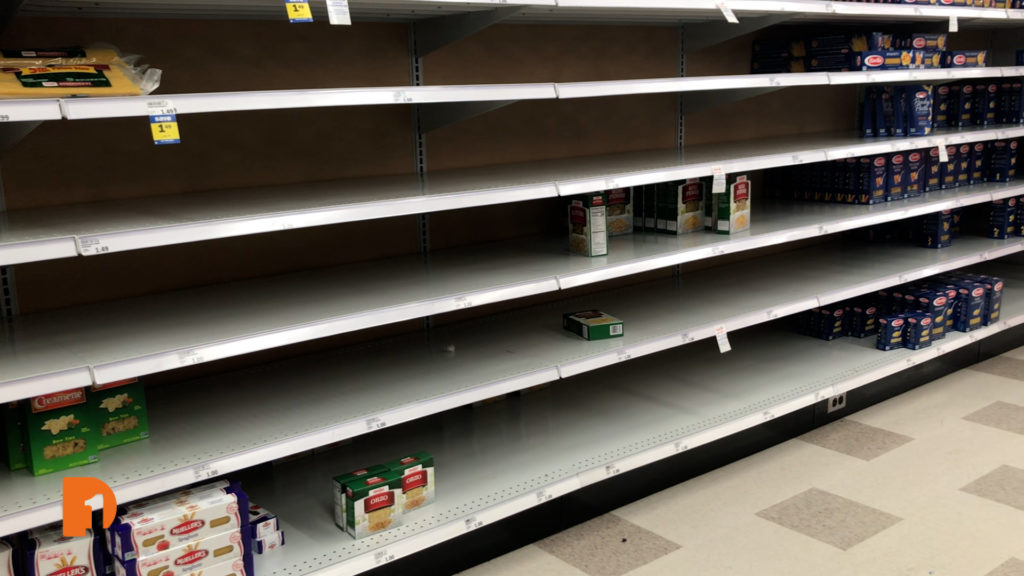They were some of America’s frontline workers, but then they called it quits. The nation’s labor shortage has impacted several industries, with workers leaving because of low wages, poor conditions or in pursuit of new opportunities, but one of the hardest-hit industries continues to be retail, especially grocery stores that have seen grocery store workers leave in droves.
RELATED: Small Businesses Coping with Challenges Ahead of the New Year
One Detroit’s AJ Walker and Natalie Reitz take a closer look at the grocery stores and examine the pandemic’s toll on grocery store workers and the labor shortage in Michigan.

Two years after the pandemic began, supply chain issues have continued to leave shelves bare. | Photo by One Detroit
Full Transcript:
AJ Walker: The grocery business in this time of COVID, an industry disrupted. Online shopping, supply chain troubles. The biggest challenge seems to be the loss of workers. They are quitting. Some just can’t take it anymore.
Sydney Michalowski, Former Grocery Worker: I was working as hard as I’ve ever worked in my entire life, yet I was still struggling to pay my basic bills. So it was like, why suffer like this?
AJ Walker: A labor shortage has turned many industries upside down. A lot of retail businesses like grocery stores.
Eric Schulz, Professor of Management, Eastern Michigan University: Right now, there’s a there’s an unprecedented, unprecedented number of jobs available in the United States.
AJ Walker: Eric Schulz, professor of management at Eastern Michigan University, tracks labor trends.
Eric Schulz: Almost 11 million jobs currently are open within the United States, and at the same time, there are 8.4 million unemployed workers. So if you think about it, that means there’s less than one American currently looking for work for available jobs that are out.
AJ Walker: Despite the pandemic, people have to eat, and many grocery store chains have posted record profits that while many grocery workers have abandoned their jobs permanently.
Eric Schulz: Prices are up about three percent across the board. Their stocks are bare, particularly at night. I mean, when you go in, it is. It’s really difficult. And again, the whole supply chain has been disrupted because there simply is a labor shortage in that industry. Not enough truckers to do things.
AJ Walker: Jeff Wells, a reporter from the industry publication Grocery Dive, says that many people left because of health concerns and because more jobs opened up.
Jeff Wells, Reporter, Grocery Dive: You saw a lot of burnout from working in stores and people realizing that they can find jobs in other sectors. If you can work from home, from a call center, you know that might seem more appealing than a grocery store job right now.
AJ Walker: Sydney Michalowski, former cashier, remembers her job changing almost overnight, from ringing up customers to managing customers trying to enforce COVID safety protocols.
Sydney Michalowski: We were enforcing masks. We were trying to maintain social distancing, especially at the very beginning. A lot of people were panic buying, so they were just like tons of people in the store buying tons of stuff, and I feel like some of that never really ended.
AJ Walker: The virus wasn’t the only safety issue. Corinne Sikorski, the longtime general manager at the Ypsilanti Food Co-op, leads a staff with safety concerns. There can be unruly customers because of mask rules.
Corinne Sikorski, General Manager, Ypsilanti Food Co-op: I think that was one of the biggest challenges we face, knowing that on the news we’re hearing about people who are bringing out their guns if they don’t want to put a mask on. And so that gave the staff a whole nother fear. Probably a more visible fear like it’s the virus isn’t visible, whereas somebody the thought of somebody bringing out a gun is more scary than something you can’t see.
AJ Walker: Stephanie Moebs, another former grocery store worker, tells of altercations with customers who wouldn’t mask.
Stephanie Moebs, Former Grocery Worker: And he started screaming at me, threatening me, saying things to me that I don’t want to repeat. And another worker came over and defended me. Later it had come out that he’d ransacked from the store, so he went to the produce department and started throwing oranges and apples, and it was quite an ordeal.
AJ Walker: Sydney and Stephanie left their jobs because of the stress. Part of the mass exodus of workers. People who have found the confidence to quit even if they don’t have a new job in place.
Sydney Michalowski: So many people were leaving and then it kind of was interesting to me that so many people were quitting and then they were like, fine. And then I was thinking, well, I’ll probably be fine, too.
AJ Walker: Stephanie’s now teaching at a Montessori school in Detroit.
Stephanie Moebs: I have a regular schedule. I have weekends, holidays off, which is really nice and not something I ever got to experience and get to be around children. And the most important thing, I think, is that I do feel respected. I do feel seen as a human being, as a fellow person. It’s been wonderful not to be in the grocery store anymore.
AJ Walker: For her, if given better pay, better working conditions and more staff to handle the load, maybe she’d still be a grocery store worker,
Stephanie Moebs: Not skeleton crews. We don’t need to see, you know, one or two people doing the work of eight or nine or 10 people. No one is going to be happy under those working conditions. No one’s going to stay.
AJ Walker: Big-Box stores have tried many different strategies to attract workers. Walmart is giving employees cell phones. Other stores offering big hiring bonuses. Smaller, more community-based grocery stores can offer something that is often left out of the conversation, a values-oriented workplace.
Corinne Sikorski: We continue to find people in spite of the labor issues that we know are out there. But I think in another way, some people might be dissatisfied with the job that they have and they are looking for something that is more community based, so they come to work at the Co-op. So in some ways, it’s actually I won’t say it’s been an advantage, but I guess it has had its silver linings for the Co-op as well.
AJ Walker: Wells says automation will solve some staffing woes. But grocery still needs workers to run new machines and help customers.
Jeff Wells: They’re going to have to get creative in how they market these jobs and the benefits that they offer. If they want to bring workers back because no matter how much automation they bring in a store, you still have to have human workers in there to make that a good experience.
AJ Walker: One of the biggest changes that could help retain staff, making grocery into a career path, not just a temporary job.
Eric Schulz: I think that would do a world of good where people can see this is this is a an industry I want to be in, where I can see a career for myself rather than just sort of a temporary job that I’ll remain in. That I think is really vital. Because again, one of the things that people are truly reassessing their work and it’s it is an opportunity for employers to reassess their workforce.
Subscribe to One Detroit’s YouTube Channel & Don’t miss One Detroit Mondays and Thursdays at 7:30 p.m. on Detroit Public TV, WTVS-Channel 56.
Catch the daily conversations on our website, Facebook, Twitter @DPTVOneDetroit, and Instagram @One.Detroit
View Past Episodes >
Watch One Detroit every Monday and Thursday at 7:30 p.m. ET on Detroit Public TV on Detroit Public TV, WTVS-Channel 56.





If we would not be treated by costumer as if we where trash , we would probably stay. But each one of us comes to the moment where we say „“ it’s not worth handling those people for this cheap pay“